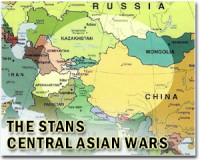| . |  |
. |
Washington (UPI) Jul 13, 2010 Afghan troops will lead an attack on a Taliban stronghold in the coming weeks, a sign that the country's security forces have strengthened, U.S. officials said. The attack will involve U.S. and international troops and will strike the Arghandab district, an area in southern Afghanistan just outside Kandahar, where some of the heaviest fighting has occurred. Arghandab is considered the "Taliban's home," said U.S. Sen. Carl Levin, D-Mich., in a news conference Tuesday. Levin and U.S. Sen. Jack Reed, D-R.I., recently returned from a trip to Afghanistan and Pakistan, where they met with top government and military officials. Levin said the attack, which is scheduled for the end of the July or early August, will be "the Taliban's worst nightmare." "This is going to be Afghan-led," Levin said. "The meaning of that will not be lost on the Afghan people and it will not be lost on the Taliban." U.S. troops won't be spared the dangerous combat in Arghandab. The terrain is difficult and casualties are expected to be high, Reed said. "We have very serious fighting ahead," Reed said. An additional 30,000 U.S. troops will be deployed over the summer to help fight the surge in the southern region of the country. The senators pointed to improvements in the Afghan army as progress in the 9-year war. Levin said the Afghan army has been actively recruiting since the announcement by U.S. President Barack Obama that the United States will begin withdrawing troops in July 2011 and turn responsibility over to Afghan forces. Levin confirmed Tuesday that the United States was on schedule for meeting that deadline. Pakistan terrorist groups continue to pose a threat to U.S. and international forces, Levin said. Terrorist organizations, including the Pakistan-based Taliban and the Haqqani network, have launched attacks over the border into Afghanistan. The Pakistan government has failed to take action against the terrorist groups, Levin said. Levin said he would ask the U.S. State Department to add both organizations to the list of foreign terrorist groups. "It's long overdue," he said. With the terrorist organizations added to the state department list, U.S. law would require Pakistan to take action against them, Levin said. If Pakistan didn't cooperate, the United States could restrict or revoke aid to the country, or even strike against the terrorist groups from inside Pakistan. "Their country is used as the launching platform for terrorist attacks," Levin said.
earlier related report "This is a temporary solution to a very real, near-term problem," said Geoff Morrell. "This would just be a stop-gap measure because we do not have enough police forces to provide security in a lot of populated areas while we are growing the ANSF (Afghan National Security Forces) on target," he added. Afghan President Hamid Karzai's office said Wednesday it approved the establishment of a grass-roots security forces, called the Local Police Force, akin to controversial village militias, that will come under the direct control of the interior ministry. US special forces in Afghanistan have already been assisting villagers organize for their own protection against the Taliban, the top US general in southern Afghanistan, Ben Hodges, told AFP. Morrell said the local defense program supported by US General David Petraeus, commander of all foreign forces in Afghanistan, "would be local community policing units, they would not be militias," unlike Iraq's Sahwas (Anbar awakening) militias. Established in September 2006, the Sahwas are made up of former Sunni insurgents retrained to fight Al-Qaeda. They have been crucial for the allied counter-insurgency campaign and have contributed to a gradual decrease in violence in Iraq. Morrell said however that the Afghan local forces "would be government formed, government paid, government uniformed local police units who would keep an eye out for bad guys in their neighborhoods." Media reports have said that Karzai had opposed the local forces plan because of its potential to weaken his government. Afghanistan's communist government of the 1980s poured money into tribal forces because its own security structures were unable to defeat an Afghan uprising against the 1979 Soviet invasion. Some of these factions grew into powerful forces that later battled each other for control of the government in a devastating civil war that ended only with the Taliban's seizure of power in 1996. Overthrown by a post-9/11, US-led invasion in 2001, the Taliban have intensified their insurgency over the past two years, spreading to nearly all corners of Afghanistan despite the presence of 142,000 international troops. US President Barack Obama has said he wants to begin drawing down troops in the middle of next year, creating a timetable for the Afghan security forces to be able to take responsibility from the foreign forces.
Share This Article With Planet Earth
Related Links News From Across The Stans
 US defense chief presses Senate on Afghan war funds
US defense chief presses Senate on Afghan war fundsWashington (AFP) July 13, 2010 US Defense Secretary Robert Gates said he pressed Republican senators during a lunchtime meeting Tuesday to help pass an embattled emergency spending measure to fund the Afghanistan troop "surge." Emerging from the closed-door talks with the lawmakers, Gates told AFP he "absolutely" called on them to help approve legislation to pump another 37 billion dollars into the wars in Iraq and Afghan ... read more |
|
| The content herein, unless otherwise known to be public domain, are Copyright 1995-2010 - SpaceDaily. AFP and UPI Wire Stories are copyright Agence France-Presse and United Press International. ESA Portal Reports are copyright European Space Agency. All NASA sourced material is public domain. Additional copyrights may apply in whole or part to other bona fide parties. Advertising does not imply endorsement,agreement or approval of any opinions, statements or information provided by SpaceDaily on any Web page published or hosted by SpaceDaily. Privacy Statement |